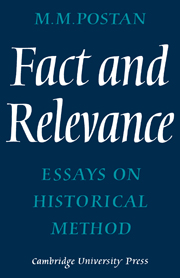Book contents
- Frontmatter
- Contents
- Acknowledgments
- Preface
- 1 Reason in social study
- 2 History and the social sciences
- 3 The historical method in social science
- 4 Function and dialectic in economic history
- 5 Fact and relevance in historical study
- 6 Economic and social history
- 7 Economic growth
- 8 A plague of economists?
- 9 The uses and abuses of economics
- 10 Agriculture and economic development: a lesson of history
- 11 Technological progress in post-war Europe
- 12 A study of history
- 13 Karl Marx: a democrat?
- 14 Hugh Gaitskell: political and intellectual progress
- Index
14 - Hugh Gaitskell: political and intellectual progress
Published online by Cambridge University Press: 07 October 2011
- Frontmatter
- Contents
- Acknowledgments
- Preface
- 1 Reason in social study
- 2 History and the social sciences
- 3 The historical method in social science
- 4 Function and dialectic in economic history
- 5 Fact and relevance in historical study
- 6 Economic and social history
- 7 Economic growth
- 8 A plague of economists?
- 9 The uses and abuses of economics
- 10 Agriculture and economic development: a lesson of history
- 11 Technological progress in post-war Europe
- 12 A study of history
- 13 Karl Marx: a democrat?
- 14 Hugh Gaitskell: political and intellectual progress
- Index
Summary
The fifteen or sixteen years between 1930 and 1945 saw important changes in Hugh Gaitskell's personal circumstances: his coming to London, his academic post at University College, his involvement with party work, his earliest election campaign, his year of study and socialist rising in Vienna, his entry into Government service with the outbreak of war, his friendship and collaboration with Hugh Dalton, and, overlaying all this, his marriage. I propose to confine myself to what I know of his political and intellectual progress in this period. We were close friends, constantly in each other's company, more especially in the years between 1929 and 1934 when I lived in London, and again between 1939 and 1943 when we both worked in the Ministry of Economic Warfare and lived in Eileen Power's and my house in Mecklenburgh Square. Moreover, our friendship was exceedingly socratic and even didactic. We argued incessantly and incontinently all the time we were together, even on walking holidays in the Lakes or at dancing parties at the Gargoyle. As a result we came to know or to believe we knew one another's ideas almost as well as our own.
I knew Hugh Gaitskell slightly in his Nottingham years. We had met once in a WEA class on the Industrial Revolution, which he was conducting, and again a few months later during his visit to London at a party given by John Gray, then a young sociologist at LSE.
- Type
- Chapter
- Information
- Fact and RelevanceEssays on Historical Method, pp. 169 - 182Publisher: Cambridge University PressPrint publication year: 1971



